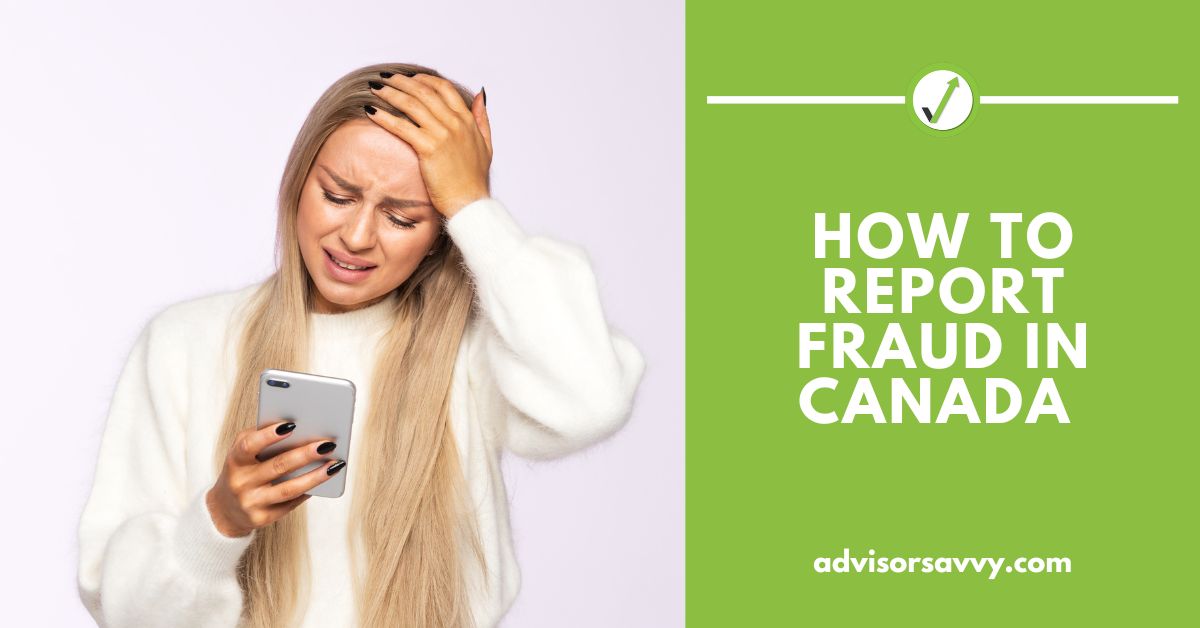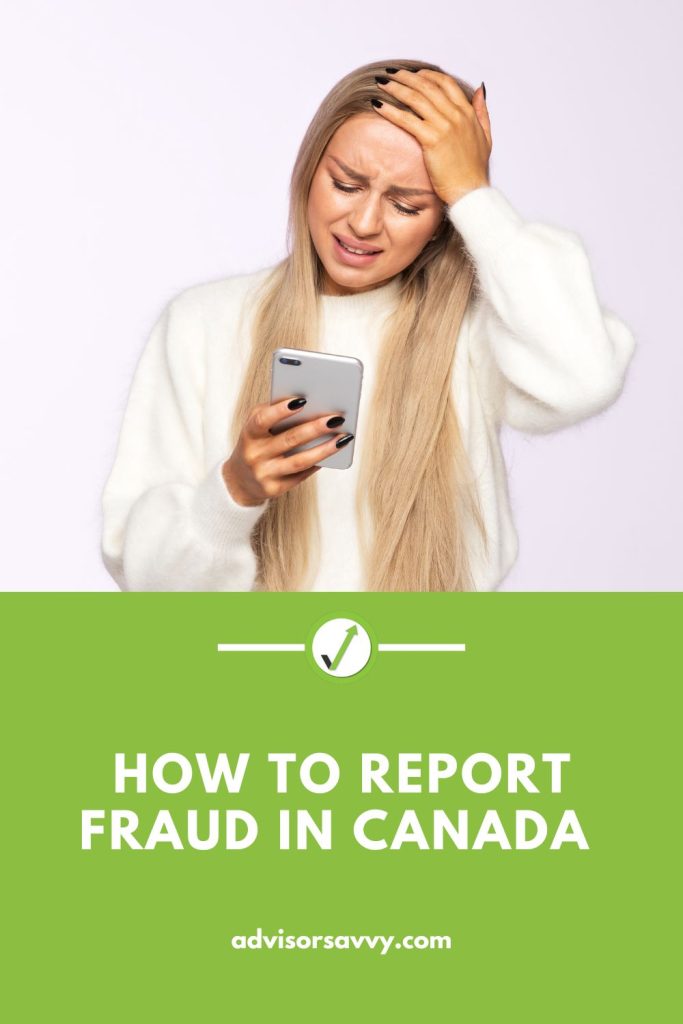
Fraud is a big issue in Canada. Every year, it costs Canadians billions of dollars. This can be in the form of stolen money, fraudulent activities or scams. If you have been a victim of fraud, or know someone who has been, it’s important to know how to report it. By reporting fraud, you can potentially get your money back and also prevent that entity from harming someone else. While falling victim to fraud can be embarrassing and irritating, you’re not alone! Try to stay calm and be kind to yourself, then take steps to report it.

Table of contents
- What is fraud?
- Fraud: How to Report in Canada
- 1. Collect all data related to the suspected fraud
- 2. Report the situation to local authorities as soon as possible
- 3. Report the occurrence to the Canadian Anti-Fraud Centre or the Competition Bureau
- 4. Report the incident to your bank
- 5. Send a notification to the website where the fraud occurred (if applicable)
- 6. Make sure to keep an eye on your credit report by flagging any changes
- How to prevent fraud
In this blog post, we will outline the steps you need to take to report fraud in Canada. We will also provide information on the different types of fraud and how to protect yourself. This includes tips on identifying fraudulent activity before it happens. Read on for everything you need to know about reporting fraud in Canada!
What is fraud?
Fraud is defined as a deliberate deception to gain something unlawful or deprive someone of their rights. Some examples of fraud are tax fraud, credit card fraud, wire fraud, securities fraud and bankruptcy fraud. Fraud on a smaller scale includes scams and identity theft. Fraudulent activity can be carried out by one person, multiple people or an entire business organization.
Fraud in finance can take many different forms, including false insurance claims, bookkeeping manipulation, pump and dump schemes, and identity theft leading to unauthorized purchases. Every year, fraud costs the economy billions of dollars, and those caught perpetrating fraudulent acts are subject to penalties like fines and jail time.
Fraudulent behavior involves making false statements or withholding important information in order to gain something that would not have been given without deception. The individual or company committing fraud is taking advantage of the fact that the victim does not have access to the same information as they do, allowing them to deceive the victim. Often, fraud involves emotional manipulation and tends to target groups of people who are unsuspecting.
If someone is caught committing fraud, they may be tried in a court of law and sent to jail if convicted. However, it is ultimately up to the government prosecutor handling the case to decide whether or not to take it to trial. Oftentimes they will just try to settle out of court if it would be quicker and less expensive.
Common types of fraud you may incur
The main types of frauds everyday Canadians may incur is debit/credit card fraud, identity theft and scams. Before learning how to report fraud in Canada, it’s important to understand the common types. More information on each can be found below.
Debit/credit card fraud
It’s fraud if a criminal obtains your debit or credit card number. When the card number or the physical card is stolen, this is considered fraudulent behaviour. If you discover fraudulently billed expenses on your debit or credit card, contact your bank immediately to report it and have the card canceled. Your credit card number may have been snatched by a company where you made a purchase. Fraudulent purchases are frequently made online, but this isn’t always the case. Your card could have been cloned as well. If you report fraud on your debit or credit card to your bank, there is a good chance you will get the funds back.
Identity theft
When fraudsters obtain access to your personal information, such as your name, address, and birth date, identity theft occurs. Fraudsters want your personal information because they may utilize it to apply for credit or make purchases in your name. They may also use it to impersonate you while committing other illegal activities which can be disastrous.
Identity fraud is the use of someone else’s identifying credentials to commit fraud. Fraudsters will often try to get your personal information in a variety of ways, such as looking through social media sites or searching through the trash for old bills or statements. Some may even send phishing emails in an attempt to trick you into giving them your information.
Scams
Scammers can attempt to get money from you in a variety of ways. Often, phishing scams occur over the phone or through email. A particularly popular scam in Canada are the Canada Revenue Agency (CRA) scams, claiming that you owe extra money for taxes. This is an effective scam because most people are fearful of overdue taxes. Normally the CRA only contacts you by letter or other written communication, so stay vigilant!
Scam websites come in all shapes and sizes, from those that publish false information to ones that guarantee huge payouts in a financial transaction. The objective is always the same though: to get you to hand over your personal or financial details. These types of sites could be standalone websites, pop-ups, or even unauthorized overlays on legitimate websites (this is known as clickjacking). No matter what they look like on the surface, these sites are carefully designed to trick users.
Many individuals have lost money to phone cons — sometimes their life savings. Scammers have discovered a variety of strategies to swindle you out of your money over the phone. They may act nice and helpful in some ploys. In other cases, they might intimidate or threaten you. A phone scammer will attempt to obtain your money or personal information so that they can commit identity theft.
Scammers will try to acquire your passwords, account numbers, or Social Security numbers by email or text message. With this information, they could gain access to your email, bank accounts, or other sensitive data. Or, they may sell this information to other scammers. Phishing attacks like these happen thousands of times a day and are often successful, unfortunately.
Fraud: How to Report in Canada
The Canadian Anti-Fraud Centre reports only a tiny fraction of fraud victims report their experiences to law enforcement. But every scam report helps police catch criminals and prevent other people from becoming victims. If you think you might be a target of fraud, take these steps:
1. Collect all data related to the suspected fraud
When fraud is suspected, it is important to collect all relevant data. This may include financial records, emails, and any other relevant documentation. You should also consider documenting the chain of events while they’re fresh in your mind — you might have to refer back to this later. Once the data has been collected, it should be reviewed by a qualified professional to look for any signs of fraud. If fraud is found, the appropriate authorities should be notified and an investigation should be launched. By collecting and reviewing all relevant data, you can help to ensure any fraud is discovered and dealt with appropriately.
2. Report the situation to local authorities as soon as possible
Fraud is a severe issue, and by reporting it to your local law enforcement, you are increasing the chances of putting a stop to the scammer. If you have lost money because of fraud, it is especially important that you call the police immediately. Keep track of all calls made and any information given for future reference.
3. Report the occurrence to the Canadian Anti-Fraud Centre or the Competition Bureau
You can contact the Fraud Reporting System (Canadian Anti-Fraud Centre) or call toll-free at 1-888-495-8501. You may also file a complaint about a misleading or deceptive marketing technique with the Competition Bureau using the online form.
4. Report the incident to your bank
If you’ve already sent money, let your financial institution know. A money service business such as Western Union or MoneyGram, a bank or a credit union, a credit card company, or an Internet payment service provider are all possible recipients. Report illegal behavior on their account to them. In some cases, they may reimburse you for money lost in fraudulent activity so there’s an incentive to report!
5. Send a notification to the website where the fraud occurred (if applicable)
If the fraud took place on a website like Facebook, eBay, Kijiji, or a dating site, report the incident immediately to the website. The “report abuse” or “report an ad” links on each site may be used to provide further information.
6. Make sure to keep an eye on your credit report by flagging any changes
It is important to take immediate action if you believe you have been a victim of fraud or identity theft. In addition to contacting the Canadian Anti-Fraud Centre, you should also contact both of Canada’s national credit bureaus – Equifax Canada and TransUnion Canada – to order a free credit report immediately and ask that a fraud alert be placed on your file. This will help to protect your credit score and prevent further damage. You can also take steps to protect yourself in the future by monitoring your credit report regularly and being cautious about sharing personal information. If you are ever in doubt, it is always best to err on the side of caution.
Related Reading: How to Check Your Credit Score in Canada
How to prevent fraud
Regularly checking your credit report is one of the best ways to prevent fraud. You can catch suspicious activity early and take corrective action to mitigate any damage.
You should also be vigilant about protecting your personal information. Only share your Social Security number, date of birth, and other sensitive personal information with trusted family members, friends, or professionals.
Be suspicious of emails and calls from unfamiliar addresses or numbers, even if they appear to be from a reputable source. If something doesn’t feel right, trust your gut and don’t respond. In addition, if the scam is coming from a trusted entity, such as the CRA, feel free to hang up and call the entity to do a second check. This could save you from falling victim to a scam.
Furthermore, watch your bank account and credit card statements for any unfamiliar charges. If you see something that doesn’t look right, contact your bank or credit card issuer immediately.
By taking these precautions, you can help prevent fraud and keep your personal information safe. As a final note, if a scam feels too good to be true (or too aggressive), it probably is. Stay vigilant!

